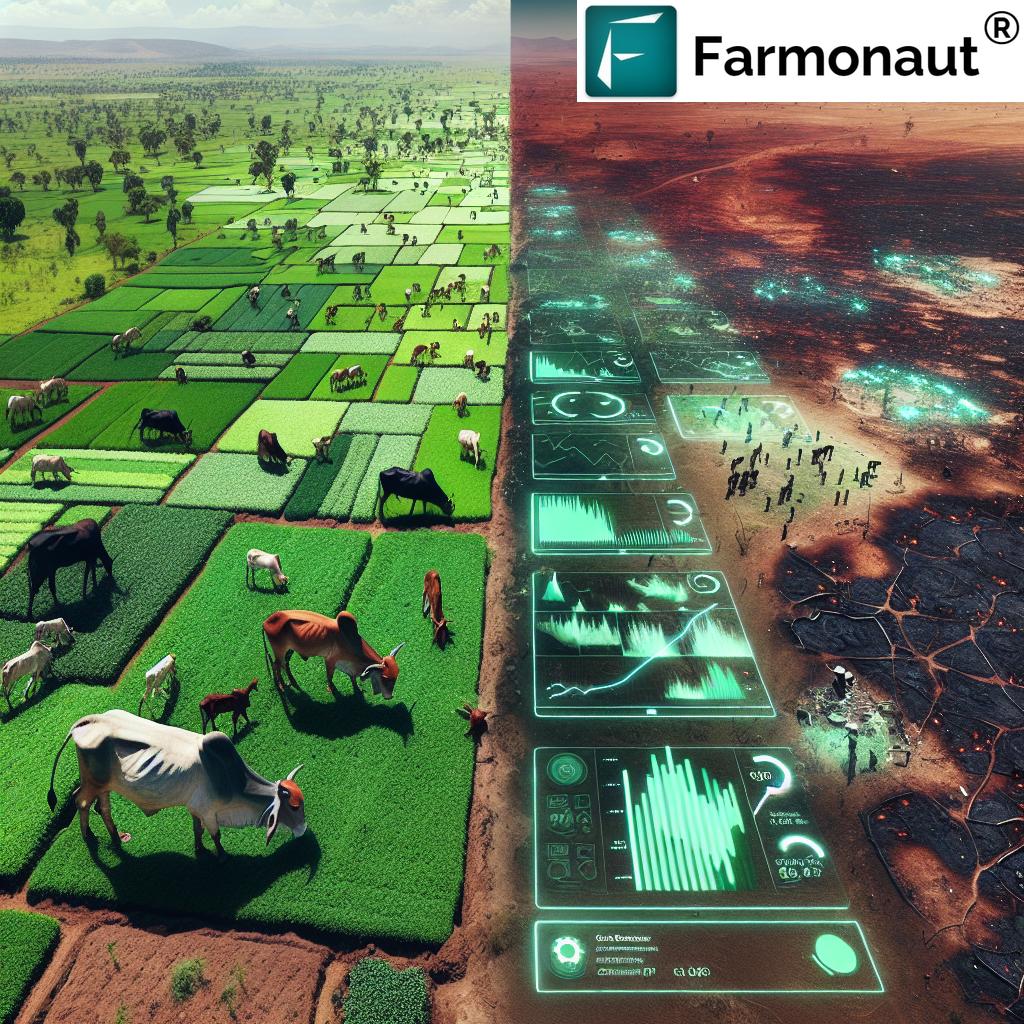Revolutionizing Cassava Breeding in Nigeria: How Handheld Spectrometers Enhance Crop Quality and Food Security
“Handheld spectrometers can save weeks of labor during cassava field trials, accelerating breeding programs significantly.”
In the realm of agricultural innovation, we’re witnessing a groundbreaking revolution in cassava breeding techniques that promises to transform food security in Nigeria and beyond. As we delve into this exciting development, we’ll explore how cutting-edge technology is reshaping the landscape of crop science and paving the way for a more sustainable future.
The Importance of Cassava in Nigeria
Cassava, a staple crop in Nigeria, plays a crucial role in the country’s food security and economy. As climate change continues to impact soils and crop yields, the need for efficient and resilient cassava varieties has never been more pressing. This is where innovative farming techniques and agricultural technology for crop improvement come into play.

The Challenge of Traditional Cassava Breeding
Traditional cassava breeding methods have long been time-consuming and labor-intensive. One of the most critical aspects of breeding is assessing the root dry matter content, a key indicator of cassava quality. However, conventional methods of measuring this trait involve a lengthy process of harvesting, drying, and weighing samples, which can take weeks to complete.
Enter the Handheld Spectrometer: A Game-Changer in Crop Analysis
In a groundbreaking study, researchers have developed an innovative approach using a handheld spectrometer for non-destructive crop analysis. This revolutionary method allows breeders to assess cassava root quality rapidly and efficiently, streamlining the process of developing improved varieties.
How Does the Handheld Spectrometer Work?
- The spectrometer uses light to analyze the chemical composition of cassava roots
- It can predict root dry matter content without the need for destructive sampling
- The device connects to smartphones, enabling real-time data collection in the field
This advancement in agricultural technology for crop improvement has far-reaching implications for food security and nutrition in regions heavily reliant on cassava.
The Impact on Cassava Breeding Programs
The introduction of handheld spectrometers in cassava breeding programs is revolutionizing the way researchers and breeders work. Here’s how:
- Accelerated breeding cycles: What once took weeks can now be accomplished in minutes
- Increased accuracy: Non-destructive analysis provides more reliable data
- Cost-effectiveness: Reduces the need for expensive laboratory equipment
- Scalability: Enables assessment of larger populations of cassava plants
These benefits collectively contribute to the development of superior cassava varieties that can withstand the challenges posed by climate change and meet the growing food demand in Nigeria and other cassava-dependent regions.
Comparing Traditional and Spectrometer-Based Cassava Breeding Methods
| Aspect | Traditional Method | Spectrometer-Based Method |
|---|---|---|
| Time for Root Quality Assessment | 2-3 weeks | Minutes |
| Labor Required | High | Low |
| Data Collection Speed | Slow | Rapid |
| Accuracy of Measurements | Moderate | High |
| Adaptability to Climate Change | Limited | Highly Adaptable |
As we can see from the table above, the spectrometer-based method offers significant advantages over traditional approaches in various aspects of cassava breeding.
Enhancing Food Security Through Innovative Breeding Techniques
The adoption of handheld spectrometers in cassava breeding is not just a technological advancement; it’s a crucial step towards enhancing food security in Nigeria and other regions where cassava is a staple crop. By enabling the rapid development of improved cassava varieties, this innovation addresses several key challenges:
- Increased crop resilience to climate change impacts
- Enhanced nutritional content of cassava roots
- Improved yield potential to meet growing food demands
- Faster response to emerging pests and diseases
“Nigeria’s innovative cassava breeding technique using spectrometers improves assessment of root dry matter content in real-time via smartphones.”

The Role of Technology in Modern Agriculture
The integration of handheld spectrometers in cassava breeding is just one example of how technology is transforming agriculture. At Farmonaut, we understand the importance of leveraging cutting-edge solutions to address agricultural challenges. Our satellite-based farm management solutions complement these innovative breeding techniques by providing valuable insights for crop monitoring and management.
For instance, our platform offers:
- Real-time crop health monitoring using satellite imagery
- AI-driven advisory systems for optimized farming decisions
- Blockchain-based traceability for enhanced supply chain transparency
These technologies work hand-in-hand with advanced breeding methods to create a more resilient and productive agricultural sector.
The Future of Cassava Breeding and Agriculture
As we look to the future, the integration of technologies like handheld spectrometers and satellite-based monitoring systems promises to revolutionize not just cassava breeding, but agriculture as a whole. Here’s what we can expect:
- More efficient breeding programs for various crops
- Increased adoption of precision agriculture techniques
- Greater collaboration between plant breeders and technology experts
- Enhanced ability to respond to global food security challenges
At Farmonaut, we’re committed to being at the forefront of this agricultural revolution, providing farmers and breeders with the tools they need to succeed in an ever-changing world.
Implications for Farmers and Agricultural Practices
The advent of spectrometer-based cassava breeding techniques has significant implications for farmers and agricultural practices in Nigeria and beyond:
- Improved Crop Varieties: Farmers will have access to cassava varieties that are more resistant to pests, diseases, and climate fluctuations.
- Higher Yields: The new varieties developed through this efficient breeding process are likely to produce higher yields, increasing farmer incomes.
- Reduced Input Costs: More resilient cassava plants may require fewer inputs such as pesticides and fertilizers, reducing overall farming costs.
- Adaptation to Climate Change: As climate patterns shift, farmers will be better equipped with varieties that can thrive in changing conditions.
These advancements align perfectly with Farmonaut’s mission to make precision agriculture accessible to farmers worldwide. Our satellite-based solutions complement these breeding innovations by providing real-time insights into crop health and field conditions.
The Role of Data in Modern Breeding Programs
The success of modern breeding programs, like the spectrometer-based cassava breeding in Nigeria, heavily relies on data. This is where Farmonaut’s expertise in satellite-based farm management comes into play:
- Data Collection: Our satellite imagery provides valuable data on crop health, soil moisture, and other critical metrics.
- Data Analysis: Our AI-powered systems analyze this data to provide actionable insights for farmers and breeders.
- Data Integration: The information gathered through our systems can be integrated with breeding data to create more comprehensive models for crop improvement.
By leveraging these data-driven approaches, we can accelerate the development of improved cassava varieties and enhance overall agricultural productivity.
Explore Farmonaut’s API for advanced agricultural data integration
Challenges and Future Directions
While the use of handheld spectrometers in cassava breeding represents a significant breakthrough, there are still challenges to overcome and opportunities to explore:
- Technology Adoption: Ensuring widespread adoption of this technology among breeders and researchers in developing countries.
- Calibration and Standardization: Developing standardized protocols for using spectrometers across different cassava varieties and growing conditions.
- Integration with Other Technologies: Exploring ways to integrate spectrometer data with other agricultural technologies, such as Farmonaut’s satellite-based solutions.
- Expanding to Other Crops: Adapting this technology for use in breeding programs for other staple crops like sweet potato and yam.
As we continue to innovate in the field of agricultural technology, Farmonaut remains committed to supporting these advancements and helping farmers leverage the power of data-driven farming.
The Broader Impact on Global Food Security
The implications of this innovative cassava breeding technique extend far beyond Nigeria’s borders. As a crop that feeds millions worldwide, particularly in developing regions, improvements in cassava breeding have the potential to significantly impact global food security:
- Increased Food Production: More efficient breeding leads to higher-yielding varieties, potentially increasing global cassava production.
- Nutritional Enhancements: Breeders can focus on developing varieties with improved nutritional profiles, addressing malnutrition in cassava-dependent populations.
- Climate Resilience: As climate change threatens food production worldwide, rapidly developed climate-adaptive varieties can help maintain food security in vulnerable regions.
- Economic Impact: Improved cassava production can boost economies in developing countries, reducing poverty and hunger.
At Farmonaut, we recognize the importance of these global challenges and strive to contribute through our innovative agricultural solutions.
Collaboration and Knowledge Sharing in Agricultural Innovation
The success of the spectrometer-based cassava breeding program in Nigeria highlights the importance of collaboration and knowledge sharing in agricultural innovation. This spirit of cooperation is something we at Farmonaut strongly believe in. Here’s how we can foster this collaborative environment:
- Research Partnerships: Encouraging partnerships between academic institutions, research centers, and technology companies like Farmonaut.
- Open Data Initiatives: Promoting the sharing of agricultural data to accelerate innovation and improve farming practices globally.
- Farmer Education: Developing programs to educate farmers about new technologies and breeding advancements.
- International Cooperation: Facilitating knowledge exchange between countries to address global agricultural challenges.
By fostering this collaborative environment, we can accelerate the pace of innovation in agriculture and work towards a more food-secure future.
Check out Farmonaut’s API Developer Docs for integration possibilities
The Role of Policy and Funding in Agricultural Innovation
The success of innovative agricultural projects, like the spectrometer-based cassava breeding program, often depends on supportive policies and adequate funding. As we look to the future of agriculture, it’s crucial to consider:
- Government Support: Policies that encourage the adoption of new agricultural technologies and breeding methods.
- Research Funding: Increased investment in agricultural research to drive innovation in crop breeding and farming techniques.
- Public-Private Partnerships: Collaboration between government agencies, private companies, and research institutions to accelerate agricultural advancements.
- Incentives for Farmers: Programs that support farmers in adopting new technologies and improved crop varieties.
At Farmonaut, we advocate for policies that promote technological innovation in agriculture and support farmers in embracing these advancements.
Conclusion: A Brighter Future for Cassava and Global Agriculture
The revolutionizing of cassava breeding techniques in Nigeria through the use of handheld spectrometers marks a significant milestone in agricultural innovation. This advancement not only enhances crop quality and food security in Nigeria but also sets a precedent for improving breeding programs worldwide.
As we’ve explored, the implications of this technology are far-reaching, touching on aspects of food security, climate change adaptation, and economic development. The integration of such innovative techniques with other agricultural technologies, like Farmonaut’s satellite-based solutions, creates a powerful toolkit for addressing global agricultural challenges.
Looking ahead, we at Farmonaut are excited about the future of agriculture. We believe that by combining cutting-edge technologies, data-driven insights, and collaborative approaches, we can create a more sustainable and food-secure world. As we continue to innovate and provide solutions that make precision agriculture accessible to farmers worldwide, we invite you to join us on this journey towards a more productive and resilient agricultural future.
FAQs
- Q: How does the handheld spectrometer improve cassava breeding?
A: The handheld spectrometer allows for rapid, non-destructive analysis of cassava root quality, significantly speeding up the breeding process and enabling more accurate selection of superior varieties. - Q: Can this technology be applied to other crops?
A: While currently focused on cassava, the principles behind this technology could potentially be adapted for use with other root crops and possibly even above-ground crops in the future. - Q: How does this innovation contribute to food security?
A: By accelerating the breeding process and enabling the development of more resilient and productive cassava varieties, this technology helps ensure a more stable food supply, particularly in regions where cassava is a staple crop. - Q: What role does Farmonaut play in agricultural innovation?
A: Farmonaut provides satellite-based farm management solutions that complement breeding innovations by offering real-time crop monitoring, AI-driven insights, and data analytics to support precision agriculture practices. - Q: How can farmers benefit from these advancements?
A: Farmers can benefit from access to improved cassava varieties that offer higher yields, better disease resistance, and enhanced climate resilience. Additionally, technologies like Farmonaut’s solutions help farmers make more informed decisions about crop management.




















